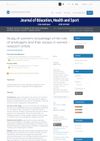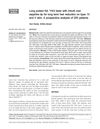 1 citations,
December 2022 in “Biomedicines”
1 citations,
December 2022 in “Biomedicines” Middle-aged women with PCOS often continue to experience symptoms related to high androgen levels, like unwanted hair growth.
 1 citations,
January 2022 in “Transgender health”
1 citations,
January 2022 in “Transgender health” Hormone therapy in transgender individuals can increase acne and affect hair growth and loss.
 1 citations,
October 2021 in “Prilozi - Makedonska akademija na naukite i umetnostite. Oddelenie za medicinski nauki”
1 citations,
October 2021 in “Prilozi - Makedonska akademija na naukite i umetnostite. Oddelenie za medicinski nauki” Many women with polycystic ovary syndrome have normal blood sugar, but some may have higher blood sugar levels or diabetes, especially if they are older, overweight, and have certain hormone levels.
 1 citations,
March 2018 in “Cureus”
1 citations,
March 2018 in “Cureus” Scrotal rejuvenation treats aging-related changes in men's scrotum using methods like medication, hair transplantation, and surgery.
 July 2023 in “Journal of Education, Health and Sport”
July 2023 in “Journal of Education, Health and Sport” Most women lack knowledge about androgens and their excess symptoms.
 June 2023 in “Clinical and Experimental Dermatology”
June 2023 in “Clinical and Experimental Dermatology” Gender-affirming hormone therapy changes hair growth in transgender people, with feminizing therapy reducing hair and masculinizing therapy increasing it, but sometimes additional treatment is needed.
 April 2023 in “Dermatologica Sinica”
April 2023 in “Dermatologica Sinica” Sex hormones affect hair growth and loss, and treatments for related hair diseases include various medications, hair transplantation, and light therapy.
 September 2022 in “Women's healthcare”
September 2022 in “Women's healthcare” PCOS is managed by lifestyle changes and personalized medication to improve symptoms and fertility.
 110 citations,
January 2014 in “The Journal of Sexual Medicine”
110 citations,
January 2014 in “The Journal of Sexual Medicine” Testosterone treatment in trans men increases body and facial hair and may lead to hair loss over time, but severe skin issues are rare.
 19 citations,
September 2004 in “Reviews in gynaecological practice”
19 citations,
September 2004 in “Reviews in gynaecological practice” Effective hirsutism management requires identifying the cause, combining new and traditional treatments, and setting realistic expectations for patients.
 January 2023 in “Open Journal of Endocrine and Metabolic Diseases”
January 2023 in “Open Journal of Endocrine and Metabolic Diseases” Hyperandrogenism is a common hormonal disorder in women, often linked to PCOS.
 204 citations,
May 2014 in “The Journal of Sexual Medicine”
204 citations,
May 2014 in “The Journal of Sexual Medicine” Hormone therapy for trans individuals is effective and generally safe in the short term.
 32 citations,
April 1994 in “Journal of the American Academy of Dermatology”
32 citations,
April 1994 in “Journal of the American Academy of Dermatology” High androgen levels and genetic factors likely cause Becker's nevus and related symptoms.
 5 citations,
January 1984 in “Journal of psychosomatic obstetrics and gynecology/Journal of psychosomatic obstetrics and gynaecology”
5 citations,
January 1984 in “Journal of psychosomatic obstetrics and gynecology/Journal of psychosomatic obstetrics and gynaecology” The treatment reduced hair growth and testosterone in women with excess hair and had some effects on stress responses.
 February 2020 in “Research Square (Research Square)”
February 2020 in “Research Square (Research Square)” Women with PCOS have worse physical health but similar mental health compared to those without PCOS.
 42 citations,
August 2017 in “Human Reproduction”
42 citations,
August 2017 in “Human Reproduction” Women with polycystic ovary syndrome tend to have a longer distance between the clitoris and anus.
 26 citations,
March 1986 in “Clinical and Experimental Dermatology”
26 citations,
March 1986 in “Clinical and Experimental Dermatology” Scalp hair grows at 0.37 mm/day, forearm hair at 0.18 mm/day, and thigh hair at 0.30 mm/day, with no significant differences found in people with certain hair conditions.
 24 citations,
December 1988 in “British Journal of Dermatology”
24 citations,
December 1988 in “British Journal of Dermatology” Acne severity in women may not be linked to increased male hormone indicators like excess body hair, menstrual irregularities, or hair loss.
 22 citations,
February 2002 in “Clinics in Geriatric Medicine”
22 citations,
February 2002 in “Clinics in Geriatric Medicine” Many elderly women experience unwanted facial hair and various hair loss conditions, with treatments available for each condition.
 12 citations,
January 2010 in “Pediatric Health”
12 citations,
January 2010 in “Pediatric Health” Early treatment and lifestyle changes are important for managing PCOS in young people to prevent long-term health issues.
 12 citations,
November 1993 in “International Journal of Dermatology”
12 citations,
November 1993 in “International Journal of Dermatology” The document explains that hirsutism, often caused by hormonal issues, can be managed with treatment to improve both physical appearance and mental health.
 11 citations,
February 2003 in “Baillière's best practice & research. Clinical obstetrics & gynaecology/Baillière's best practice and research in clinical obstetrics and gynaecology”
11 citations,
February 2003 in “Baillière's best practice & research. Clinical obstetrics & gynaecology/Baillière's best practice and research in clinical obstetrics and gynaecology” Acne and increased body hair in teenage girls are normal but severe cases may need hormone evaluation and treatment can prevent diabetes linked to PCO.
 11 citations,
January 2001 in “Cambridge University Press eBooks”
11 citations,
January 2001 in “Cambridge University Press eBooks” Androgens can cause hair growth in some areas but hair loss on the scalp.
 10 citations,
December 2010 in “British Journal of Dermatology”
10 citations,
December 2010 in “British Journal of Dermatology” After menopause, some women lose scalp hair and gain facial hair, with patterns suggesting different underlying causes.
 10 citations,
January 2010 in “Indian journal of dermatology, venereology, and leprology”
10 citations,
January 2010 in “Indian journal of dermatology, venereology, and leprology” Long pulsed Nd: YAG laser is safe and effective for long-term hair reduction in darker skin types.
 8 citations,
July 2012 in “Cambridge University Press eBooks”
8 citations,
July 2012 in “Cambridge University Press eBooks” Androgens can both increase body hair and cause scalp hair loss.
 June 2006 in “British Journal of Dermatology”
June 2006 in “British Journal of Dermatology” Lower adrenal hormone levels may cause hair loss in postmenopausal women, certain patterns help diagnose nail cancer, and a gene variant linked to higher skin cancer risk in kidney transplant patients suggests monitoring folate levels.

Women with polycystic ovary syndrome (PCOS) show higher levels of hope, judgement, perspective, and transcendence, and could benefit from positive psychology therapy.
 16 citations,
July 2020 in “Health and Quality of Life Outcomes”
16 citations,
July 2020 in “Health and Quality of Life Outcomes” Women with Polycystic Ovary Syndrome (PCOS) have a lower health-related quality of life, especially those with an anovulatory phenotype, and may need specific interventions to improve it.
 August 2007 in “Drug and therapeutics bulletin”
August 2007 in “Drug and therapeutics bulletin” Eflornithine's effectiveness for women with facial hirsutism is unclear.






























